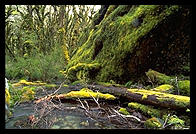
Routeburn Track
by Philip Greenspun, part of the New Zealand Story.[ Back | Table of Contents | Map | On to Queenstown/West Coast ]

|
Routeburn Trackby Philip Greenspun, part of the New Zealand Story.[ Back | Table of Contents | Map | On to Queenstown/West Coast ] |
December 30
We rose late and drove to the south end of the Routeburn Track through a dreary shower, not starting to hike through the downpour until 11 pm. Our tramping party consisted of Marc, Alex, Saeko, Micha, Marita, Trudi, and Brigitte. Lucy would drive the bus around to Queenstown with the other passengers and we would all meet there.
I spent most of the first day on the trail with Marita, who worked as a nurse in the same German hospital as Dorothea. Of medium height with a shock of dark red hair that somehow contained an infinite variety of color, Marita had a beautiful fine-boned figure. Her manner had struck me as distant and this was the first time I'd talked to her at length. I discovered to my delight a really sensitive and perceptive interior, just the kind of person you'd want next to you when you were sick.
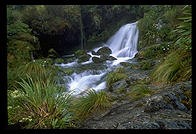 Although I have a couple of photographs of moss-draped forest and swollen
waterfalls, the primary mental impression of Day 1 was Thank God for
Gore-Tex. Despite the rigors of this three day walk in the face of
Nature's wrath, I was unable to feel even the slightest bit intrepid. After a
couple of hours on the trail, we met a plastic surgeon from Sacramento and his
wife who were running/walking the entire 38 km in one day.
Although I have a couple of photographs of moss-draped forest and swollen
waterfalls, the primary mental impression of Day 1 was Thank God for
Gore-Tex. Despite the rigors of this three day walk in the face of
Nature's wrath, I was unable to feel even the slightest bit intrepid. After a
couple of hours on the trail, we met a plastic surgeon from Sacramento and his
wife who were running/walking the entire 38 km in one day.
No matter the weather, tramping in New Zealand is a lot easier in many ways than hiking in America. Most of the tracks have huts spaced an easy day's walk apart. Each hut has, at a minimum, beds and a kitchen. All one really needs to carry is a sleeping bag and food.
The McKenzie Hut on the popular Routeburn is particularly swank. An outdoor porch looks out over beautiful Lake McKenzie with its mist rising up into the mountainsides that surround it. Inside there are flush toilets, running water, plentiful gas cooking rings, and a warm friendly atmosphere in the common room. Chris and Sally, two Australians from Sydney, befriended me. Chris was a physical therapist and she stretched with me for awhile and entertained me with facts about her hometown, including that it has the largest gay population outside of San Francisco. This sowed a seed in the back of Trudi's head, for when Marcus, a really handsome young German blond, joined us, Trudi started to rib him about whether he had chosen the correct ear to pierce given his (hetero) sexual orientation. Trudi knew more about piercing than I would have expected for someone from a small Swiss village.
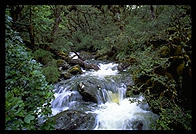 "A lot of girls these days have their nipples pierced, you know," Trudi
offered, "and even `downtown.'"
"A lot of girls these days have their nipples pierced, you know," Trudi
offered, "and even `downtown.'"
Where did she learn that bit of American slang?
"I watch Say, Brother on television."
After a satisfying dinner, mostly cooked by ever-solicitous Brigitte, we all retired to the upstairs bunkroom, my sleeping bag happening to fall between Alex and the flu-stricken Saeko. Saeko decided she wanted two male admirers to give her comfort and squeezed in between us, graciously offering the rather large space she'd vacated to a mountain man newcomer. Although with my earplugs, I didn't notice, Alex reported him to be a champion snorer.
December 31, 1992
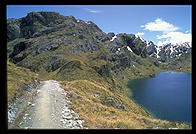 The morning opened cloudy and damp. As I spread some deodorant under my
arms, Alex dryly noted "We call that an Italian shower." After a breakfast of
hot milk and muesli, we set off in varied spirits. Alex actually looked
confused when I told him my legs and feet ached from the previous day's effort.
Brigitte's slim body, blond hair, and clear blue eyes gave her a delicate look,
but the hike up to McKenzie hadn't strained her either. On the other end of
the spectrum was Trudi, who had a tough time making the 500 meter climb to
Harris Saddle. Her pace was pretty good for sightseeing, so I stuck with her
and even carried some of her heavier items.
The morning opened cloudy and damp. As I spread some deodorant under my
arms, Alex dryly noted "We call that an Italian shower." After a breakfast of
hot milk and muesli, we set off in varied spirits. Alex actually looked
confused when I told him my legs and feet ached from the previous day's effort.
Brigitte's slim body, blond hair, and clear blue eyes gave her a delicate look,
but the hike up to McKenzie hadn't strained her either. On the other end of
the spectrum was Trudi, who had a tough time making the 500 meter climb to
Harris Saddle. Her pace was pretty good for sightseeing, so I stuck with her
and even carried some of her heavier items.
After we'd climbed out of the forest, the day turned stunningly beautiful and we were as grateful for the sunshine as any troglodytes. Under a deep blue sky with just enough clouds for interest were snow-clad peaks and lush valleys all the way down to Martin's Bay (part of the Tasman Sea). The mountains by themselves would have been stunning, so the waterfalls, streams, and lakes dotting the landscape seemed like jewels.
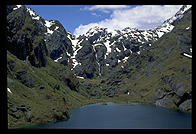 I nursed my blisters on the steps of the Harris Saddle shelter and gazed out at
a large lake ringed by white peaks and fed by numerous waterfalls. The lake
itself then emptied into a series of larger waterfalls. I slowly followed
these waterfalls down all of the 500 meters that I'd climbed in the morning,
winding up at the Routeburn Flats Hut around 5:00 pm. I stripped off my
clothes and waded into the wide stream in front of the hut. The water, which
I'd seen melting off glaciers and tumbling over falls earlier in the day, was
shrivelingly cold.
I nursed my blisters on the steps of the Harris Saddle shelter and gazed out at
a large lake ringed by white peaks and fed by numerous waterfalls. The lake
itself then emptied into a series of larger waterfalls. I slowly followed
these waterfalls down all of the 500 meters that I'd climbed in the morning,
winding up at the Routeburn Flats Hut around 5:00 pm. I stripped off my
clothes and waded into the wide stream in front of the hut. The water, which
I'd seen melting off glaciers and tumbling over falls earlier in the day, was
shrivelingly cold.
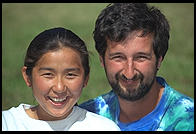 The Flying Kiwi crowd assembled around a picnic table for dinner and
conversation. Marc and Yuki presented by example the romantic view of human
relations. Nobody knew how Marc had done it, but this 23 year-old traditional
Japanese girl had fallen for his French charm after just five days. Yuki was
the flip side of Saeko. Her face could have come straight out of Van Gogh's
collection of Japanese scrolls. She came from a good family and had a fine
education from Waseda University. Yuki's smile was almost as infectious as
Brigitte's and she had a charming impatience to make herself understood in
English: she'd shake her hands in circles from the wrists while trying to
think of the right words. There was probably a lot more to Yuki than I suspect
for when she thought nobody was looking she looked rather pensive, but when
spoken to she'd instantly paint on a brilliant smile.
The Flying Kiwi crowd assembled around a picnic table for dinner and
conversation. Marc and Yuki presented by example the romantic view of human
relations. Nobody knew how Marc had done it, but this 23 year-old traditional
Japanese girl had fallen for his French charm after just five days. Yuki was
the flip side of Saeko. Her face could have come straight out of Van Gogh's
collection of Japanese scrolls. She came from a good family and had a fine
education from Waseda University. Yuki's smile was almost as infectious as
Brigitte's and she had a charming impatience to make herself understood in
English: she'd shake her hands in circles from the wrists while trying to
think of the right words. There was probably a lot more to Yuki than I suspect
for when she thought nobody was looking she looked rather pensive, but when
spoken to she'd instantly paint on a brilliant smile.
If Marc and Yuki were ignoring all the facts that might separate them, Trudy relished delivering "truths" that she'd learned in her 48 years but that other people glossed over.
"Listen to me," Trudy collared the younger women at the table, "the most important thing in a husband is to find a man who is inventive so he can keep you satisfied in bed."
Marita also had some cautionary advice drawn from personal experience: "I think every man will keep two girls if he can."
That sparked Trudy: "remember that men pay more attention to young women so take advantage of it now."
I admired Trudy for having the spunk to get up and do a group tour like this alone, but my pride was a little insulted when she said that "America is a Fourth World country. New Zealand is a Third World country, but America is Fourth World."
I remembered the editor of the British journal Nature saying that he'd looked up all the papers they'd published in one year and it turned out that 80% described research done in the U.S. What about all of the technical innovations that come from the U.S.?
"I've been to Miami, Philip. You can't tell me that America isn't Fourth World," Trudy responded.
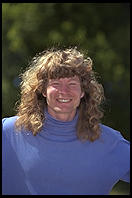
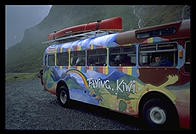 This was my first chance to get Micha away from his job, wife, and kids. After
one look at the Flying Kiwi brochure, I was pretty sure that I knew what it was
all about. The pictures plainly showed that the bus was painted psychedelic
and that the owner was a hippie with long unkempt hair so I figured there would
plenty of good dope and everyone would be relaxed.
This was my first chance to get Micha away from his job, wife, and kids. After
one look at the Flying Kiwi brochure, I was pretty sure that I knew what it was
all about. The pictures plainly showed that the bus was painted psychedelic
and that the owner was a hippie with long unkempt hair so I figured there would
plenty of good dope and everyone would be relaxed.
Well, our bus had just joined the Flying Kiwi fleet so it was as yet unpainted; there were no drugs; Micha might have looked mellow but inside he was wound pretty tight. He was tenacious in argument and disdained traditional notions of reason except when it suited him. We had no trouble imagining him in an interview with the German Army.
"I applied for Conscientious Objector status, but they don't like to give that to anyone in Germany," Micha explained. "They grill you for hours trying to get you to admit that violence could be justified sometimes and if you admit that, you're handed a rifle. When they asked me `What would you do if the Russians came into your family's house and wanted to kill your parents?' I answered `I would give them flowers.' They gave up eventually."
Although he'd escaped military service, Germany didn't have enough room for Micha, his lifestyle, or his ideas.
"You can't even name your children in Germany. `Rubin' means `ruby' in German, but it isn't on the list of approved names so we could never have gotten a birth certificate for him there. The government has a big book and if the name isn't in the book, you can't use it."
Traditional science and engineering were deeply corrupted by Big Government and big corporations in Micha's view. The world is a really wonderful place full of bounty for everyone, but governments and corporations have stolen the good stuff and keep the common people from discovering the physics that would set them free.
"I'd really like to run these tours without using oil," Micha said, "and when I get some time I think I'll build a car that can be pedaled by six people. You'd have not much more wind and rolling resistance than a single bike, but the power of six riders so it would be practical for long distances. Solar power might be a better way to go, but the oil companies are keeping efficient solar cells from being developed?"
How?
"Exxon will do anything, even kill scientists who develop new solar cells."
I argued that Micha's opinion of scientists and engineers was in some sense too high, that there were problems that were just hard. In any case, oil was a low-margin business and if one of the companies could develop a really great solar cell, they'd be better off selling it than killing the scientists involved even if they could keep the murder of a government-funded university researcher secret.
Micha was unmoved. In fact, he was generally disdainful of the rationalist way of looking at things that traditional science and engineering education inculcates. With my two MIT degrees (math, 1982, EECS, 1993), I represented precisely the sort of person that Micha thought the world needed fewer of.
"Look how your life is dependent upon traditional engineering," I offered in my defense. "You couldn't run your business if engineers thought the way you think is right. The tires wouldn't last two days, the engine would fail, if the engineers who designed it hadn't sat at their desks and worked in exactly the way that you think is so wrong."
I thought that Micha would surely be convinced or angry or something, but he retained his beliefs and a vaguely superior smile to go with them.
At midnight we all went outside. Brigitte had thoughtfully brought two candles and a Pepsi bottle filled with white wine. We counted down the seconds to midnight and then kissed each other Happy New Year and sang Auld Lang Syne (which means nothing in German either; Ducky says that it is Old English--she should know because she also went to New Zealand; the American Heritage Dictionary claims it is Scottish). I asked around if people had special wishes for New Year's. Alex had none. We pressed him, but he was perfectly content with his life. Brigitte, having been recently disappointed in romance, wished for "more luck than in 1992." Echoing her theme, I wished to "recognize hearts of gold and not to be taken in by Fool's Gold." Brigitte, Marita and I stayed out until 1 am looking for shooting stars in the unfamiliar southern sky, which has no Big Dipper and where Orion is reversed.
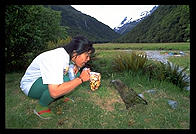
[ Back | Table of Contents | Map | On to Queenstown/West Coast ]